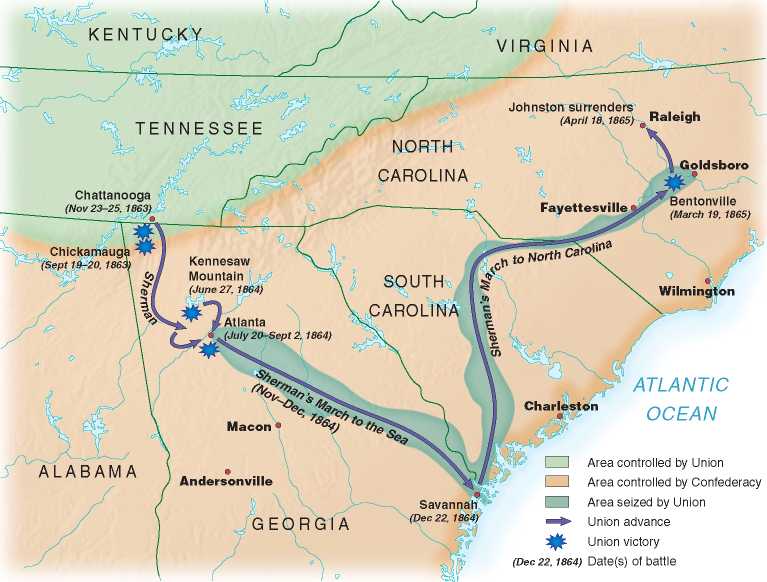The summer of 1864 saw the North submerged in pessimism. The Army of the Potomac held Lee at bay but appeared powerless to defeat him. In Georgia, General Sherman inched forward methodically against the wily Joseph E. Johnston, but when he tried a direct assault at Kennesaw Mountain on June 27, he was thrown back with heavy casualties. In July Confederate raiders under General Jubal Early dashed suddenly across the Potomac from the Shenandoah Valley to within five miles of Washington before being turned back. A draft call for 500,000 additional men did not improve the public temper. Huge losses and the absence of a decisive victory were taxing the northern will to continue the fight.
In June, Lincoln had been renominated on a National Union ticket, with the Tennessee Unionist Andrew Johnson, a former Democrat, as his running mate. He was under attack not only from the Democrats, who nominated General McClellan and came out for a policy that might almost be characterized as peace at any price, but also from the Radical Republicans, many of whom had wished to dump him in favor of Secretary of the Treasury Chase.
Table 14.1 Turning Points in the War
Pivotal Battles | Date | Outcome | Consequence |
Ft. Sumter | April,1861 | Confederates fire on Ft. Sumter; Union garrison surrenders | Civil War commences |
First Bull Run | July,1861 | Confederate victory | Northerners sobered, Southerners exhilarated; no swift ending to war likely |
Shiloh | April,1862 | Tactical Union victory | 23,000 casualties stagger everyone:Was the war worth such a high cost? |
Antietam | September, 1862 | Lee's advance northward halted | Lincoln, confidence regained, issues Emancipation Proclamation freeing slaves in rebel areas |
Chancellorsville | May, 1863 | Lee defeats Union army that had crossed into Virginia | Emboldened by victory, Lee invades North in search of decisive victory |
Gettysburg | July,1863 | Confederate defeat; Lee retreats to Virginia | Confederate hopes dashed |
Vicksburg, | July,1863 | Grant seizes control of lower Mississippi River | Texas and Arkansas cut off from the Confederacy |
Wilderness and Cold Harbor | May and June, 1864 | Lee inflicts staggering losses on Union troops | Though criticized as a butcher, Grant perseveres, backed by Lincoln: War becomes battle of attrition |
Sherman's March | November, 1864 through March, 1865 | Sherman drives through Georgia and South Carolina | Demoralizes South |
Siege of Petersburg | June 1864 through April 1865 | Lee's defenses exhausted | South surrenders |

Sherman Pierces the Heart of the South, 1864-1865 After slogging through tenacious Confederate resistance in the Appalachians, Sherman finally broke through and seized Atlanta in September, 1864; he then marched ”to the sea” to Savannah and in 1865 drove north through South Carolina and into North Carolina.




 World History
World History









